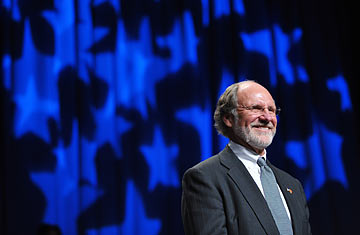
New Jersey Governor Jon Corzine at a gubernatorial campaign rally in Camden, N.J.
Welcome to America's 2009 off–off year elections, in which partisans and analysts hope to turn the usual dictum on its head: today, they'll try to convince you, all politics is national. Much will be made of the results, whatever they are — likely too much, in fact. But as the first sign of Democratic and Republican electoral strength since Barack Obama was elected one year ago, the results bear watching.
Among all the local races and ballot measures, three contests stand out as potential indicators of how Democrats and Republicans will fare in the 2010 midterms, and how much (or how little) Obama has changed the contours of American politics.
New Jersey and Virginia are the only two states that elect chief executives the year after the country picks a new President, so the contests there — in Virginia the governor's mansion is open, and in New Jersey Democrat Jon Corzine is seeking re-election in a ferocious three-way battle — assume outsized importance in the political world as ostensible bellwethers.
Virginians in particular have consistently repudiated the new President by choosing a governor from the opposite party. The Old Dominion is likely to follow that pattern again in 2009, with Republican Bob McDonnell holding a substantial lead in recent polling. If the Democrat, Creigh Deeds, loses, the GOP will retake the executive mansion in Richmond for the first time in over a decade. Democrats will blame the loss on local issues and a weak effort by Deeds, but there will be no denying that Obama and his agenda played a role. Some conservatives are turned off by the Administration's enacted and proposed expansion of government; some liberals are demoralized by Obama's failure to push their agenda. A McDonnell win would serve as a check on Democratic momentum in a state Obama won in 2008 after no Democratic presidential candidate had been victorious there in a generation, and signal a modest GOP comeback against the tide of last year.
In New Jersey, incumbent governor Corzine — already tarnished in the eyes of voters by his past as a Wall Street executive — has been hurt in his race against Republican former prosecutor Chris Christie by flare-ups of local public corruption and by eye-popping property-tax rates. But Corzine has fought back from a near fatal deficit earlier in the year thanks to four factors: 1) the rise of Chris Daggett, an independent candidate who has drawn votes away from Christie, giving Corzine a chance to win with far less than 50% of the vote, 2) the focus on Christie's personal baggage, such as the shady circumstances involving his office spending, an unreported loan to a top aide and a 2005 traffic violation, 3) Corzine's spending millions of dollars from his own fortune and 4) the Democratic Party's all-out effort to save the seat.
Obama has made several visits to New Jersey, most recently last weekend; he still enjoys the warm embrace of this blue state with a large African-American population and numerous progressive voters. The final public and private polling in the race favors the Republicans, but the White House isn't giving up hope that Corzine can pull off a surprise. A Democratic defeat in New Jersey will say more about Corzine than the party, and about anger at incumbents across the board in these troubled times, but Republicans will still push the blame on Obama.
The most interesting race of the three marquee contests is for New York's 23rd congressional seat, a sprawling northern district that stretches to the Canadian border. The White House tapped the former occupant, Republican John McHugh, to be the Secretary of the Army, in part to put the seat in play. Democratic businessman Bill Owens was scheduled to face off against liberal Republican Dede Scozzafava, who was nominated by local party leaders in a closed process. National conservatives, including Sarah Palin and several potential presidential candidates, rallied around a third-party candidate, conservative multi-millionaire accountant Doug Hoffman. That sent an ongoing debate within the party into hyperdrive: Is it more likely to reverse its fortunes with moderate candidates that appeal to like-minded electorates in areas like the northeast or by backing hard-line conservatives to sharpen the contrast against the Democratic opposition?
Over the weekend, Scozzafava, her support crumbling in the face of Hoffman's well-financed blitz, quit the race and endorsed Owens. National Democratic officials and leftist pundits are arguing that even if Hoffman wins the race and keeps the seat in Republican hands, it will show that the GOP is hopelessly addicted to appeasing a shrinking conservative base that represents about a quarter of the total electorate. If Owens is victorious, Democrats plan to argue that the opposition is badly divided and unable to run big-tent candidates.
While it is true that there is a tactical split in the Republican Party, the circumstances in this contest are unusual — and unlikely to be representative of a broader pattern. Scozzafava is an exceedingly liberal Republican and Hoffman is not as conservative as some are making him out to be. Still, there will be cases next year in which right-wing forces may be emboldened to support primary challenges to more moderate candidates, potentially dividing the GOP.
While the elements in the New York special election are unusual, nothing is more sui generis than the race taking place 300 miles to the south, in which the outcome is in no doubt. New York City's mayor, billionaire Michael Bloomberg, is widely expected to win a third term after leading an effort to overturn New York City's term-limit law and spending tens of millions of his own money to bury his Democratic opponent. The only lessons to be drawn from New York City's mayoral race involve smart, free-spending, billionaire incumbents — none of which will be on the ballot in 2010.
